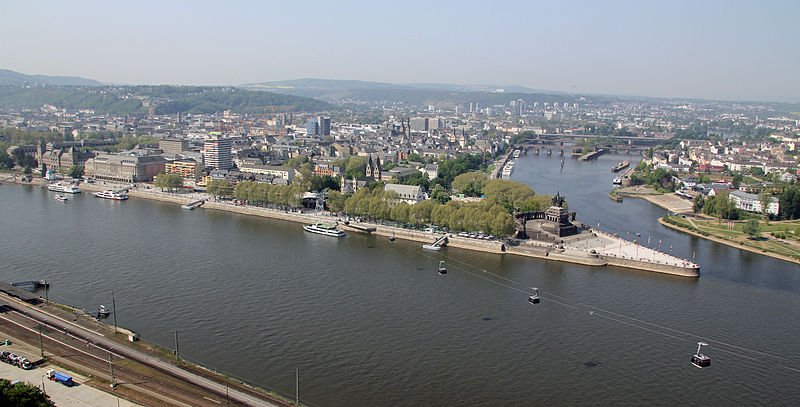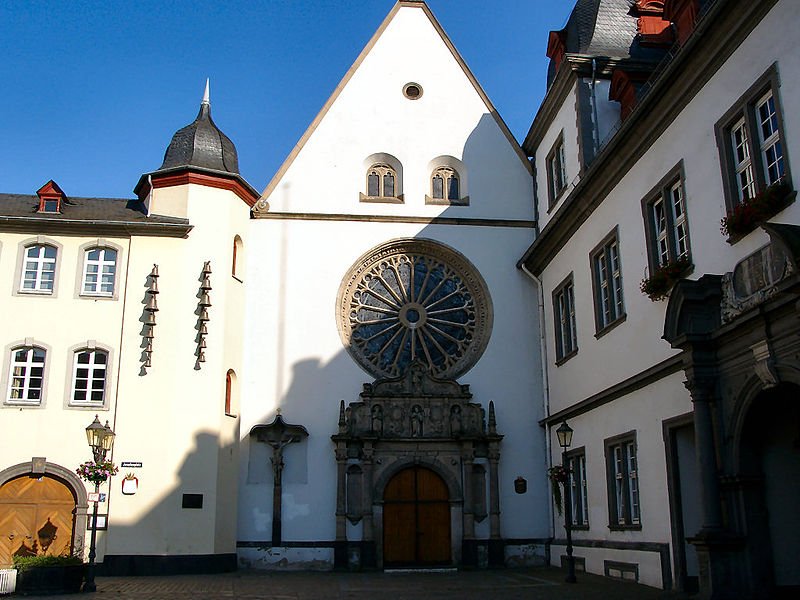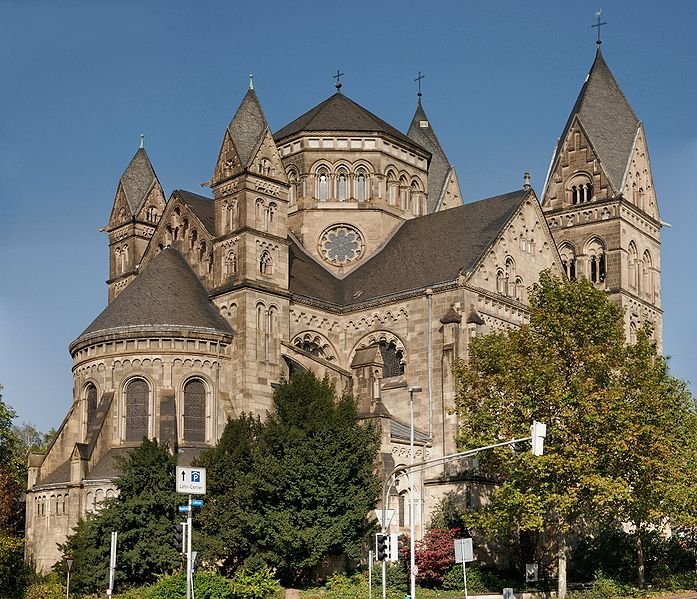 Koblenz, Germany
Koblenz, GermanySource: https://commons.wikimedia.org/wiki/File:Koblenz_im_Buga-Jahr_2011_-_Panoramablick_auf_Koblenz.jpg
Author: Holger Weinandt

Koblenz is a city along the river Rhine, at the confluence with the River Mosel, in Rhineland-Palatinate, Germany, between Bonn and Wiesbaden. It covers 105 sq km (40.5 sq mi) and has a population of 106,000 (2011 estimate). The city is in the Central European Time Zone (UTC+1) and in summer the Central European Summer Time (UTC+2).
 Jesuitenkirche, Koblenz
Jesuitenkirche, KoblenzSource: https://commons.wikimedia.org/wiki/File:Jesuitenkirche_Koblenz_2.jpg
Author: Holger Weinandt

The history of Koblenz goes back to Celtic times. The Romans under Julius Caesar built a bridge here. The name comes from Latin, ad confluentes, meaning "confluence". After the decline of the Western Roman Empire, Koblenz was taken over by the Franks and later became part of the Holy Roman Empire.
Koblenz was the seat of the Archbishop-Elctors of Trier from the Middle Ages to the 19th century. It was invaded by France several times in its history. Following the French occupation in World War I, the city changed its spelling from Coblenz, which was more French, to Koblenz, which is more German. As with many cities with a manufacturing base, Koblenz suffered from heavy bombing during the Second World War. After the war, it served as the seat of government for Rhineland-Palatinate from 1947 until 1950.
 Herz-Jesu-Kirche, Koblenz
Herz-Jesu-Kirche, KoblenzSource: https://commons.wikimedia.org/wiki/File:Herz-Jesu-Kirche_%28Koblenz%29.jpg
Author: Brego

Today Koblenz is a major hub for the regional wine trade. The city also has an industry producing mineral water along with a manufacturing base for automotive parts, machinery and barges.
Visiting Koblenz
Koblenz is within an hour's train journey from three major airports, Frankfurt Airport (FRA), Frankfurt-Hahn Airport (HHN, low-cost carriers such as Ryannair, Wizz Air, Pegasus Airlines), the Cologne/Bonn Airport (CGN). Koblenz Old Town
Koblenz Old TownSource: https://commons.wikimedia.org/wiki/File:Altstadt_Koblenz.jpg
Author: Holger Weinandt

Places of Interest in Koblenz
- Alte Burg
Fortress built by the von Arken family in the Middle Ages. - Basilika St. Castor
Collegiate church first built in AD 817 by the Archbishop of Trier. - Deutsches Eck
Literally, the German Corner, this is where the Mosel flows into the Rhine. An equestrian statue of Emperor Wilhelm I marks the spot. - Festung Ehrenbreitstein
One of the biggest fortresses in the world, the Fortress of Ehrenbreitstein was expanded by successive archbiships and electors of Trier. It now houses the Landesmuseum Koblenz, the regional museum, and the Rhein-Museum. - Florinsmarkt
Market square in Koblenz named after the Romanesque-Gothic Church of St. Florin facing it. - Kurfürstliches Schloss
Palace of the Elector, built in the early Neo-Classical style. - Liebfrauenkirche
The Church of Our Lady, sited at the highest point in Koblenz Old Town. Present structure dates to AD 1182. - Ludwig-Museum im Deutschherrenhaus
A complex of buildings which belonged to the Order of the Teutonic Knights, only a portion of it surviving to present time.
UNESCO World Heritage Site in Koblenz
- Upper Middle Rhine Valley
This World Heritage listing covers a stretch of Rhine valley with Koblenz at the northern end. It is an area with many historic castles, old towns and vineyards.
In the vicinity of Koblenz
- Maria Laach Abbey
One of the finest examples of German and European Romanesque architecture, the Maria Laach Abbey is situated next to Laacher See, the lake formed by an extinct volcano.
 Latest updates on Penang Travel Tips
Latest updates on Penang Travel Tips

Copyright © 2003-2025 Timothy Tye. All Rights Reserved.

 Go Back
Go Back